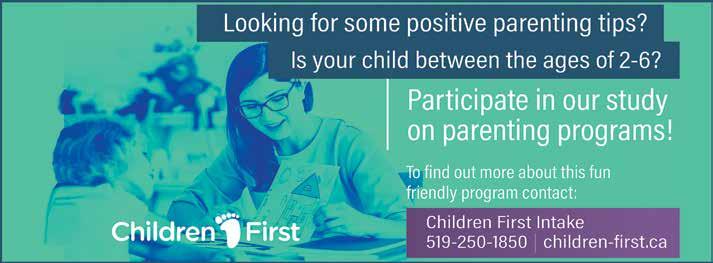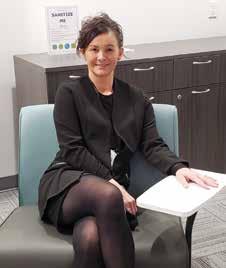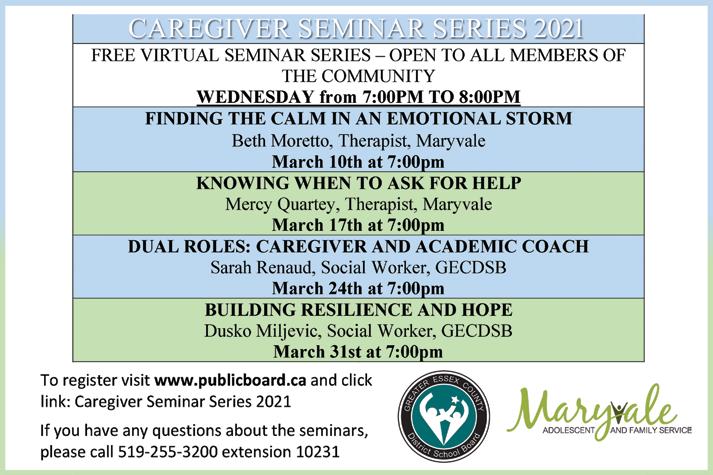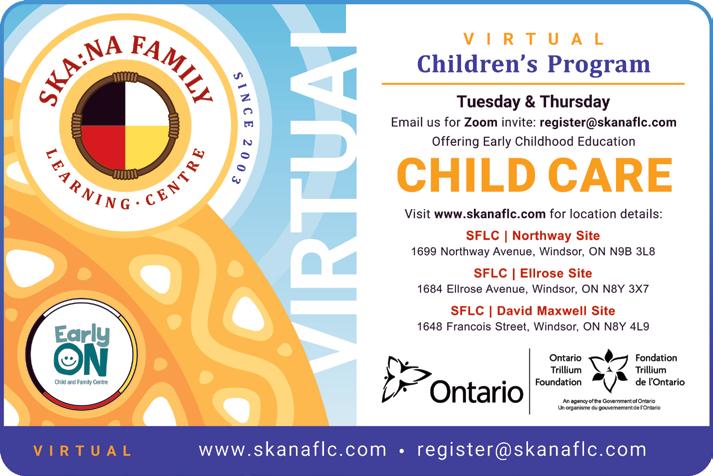
20 minute read
The Parenting Biz: Good Mental Health Is Essential For Children
Help Turn That Frown Upside Down!
Area mental health experts are here for your child and family
Advertisement
By Matthew St. Amand
One thing people likely will not miss, once the COVID-19 global pandemic has passed, is most of the news being “All COVID, all the time!” The coronavirus outbreak has been the O.J. Simpson trial of public health events.
Pandemics have occurred throughout human history, many more catastrophic than this current strain of the coronavirus.
Each event had its own, unique historical footprint, and COVID-19 will be no different. Aside from the technology used to treat those infected, and to create a vaccine to fend it off, there is another aspect of the current crisis that is unique to our time — the focus on mental health.
The toll of open-ended lockdowns on the human psyche is an ongoing conversation. People are social creatures and the isolation of “sheltering in place” for prolonged periods, comes with a cost.
In the realm of criminal justice, the subject has been studied and debated at length. In a 2018 edition of Psychology Today, UN Special Rapporteur Juan E. Mendez’s report is quoted: “Solitary confinement, [as a punishment] cannot be justified for any reason, precisely because it imposes severe mental pain and suffering beyond any reasonable retribution for criminal behaviour and thus constitutes an act defined [as] . . . torture.”
Sheltering in our homes is not fully comparable to solitary confinement in prison, but its effects should not be minimized.
At the beginning of the COVID-19 pandemic, during the first lockdown, memes were rife on social media, downplaying the effects, speaking of previous generations that endured World War I, the Great Depression, and World War II, and people of today simply being asked to sit on their couches all day watching TV.
Soft-pedalling our collective experience in that way is neither accurate, nor is it helpful.
While adults struggle with the effects of limited social contact with the outside world, balancing bills with altered work schedules and interrupted income, it’s easy to forget the effects the pandemic has on our kids.
Books on parenthood stress the need for structure and routine in the lives of children.
With the school year interrupted for those attending, and with thousands of children learning online, at home, structure and routine are two more casualties of these unprecedented times.
Biz X reached out to mental health experts in Windsor and Essex County to learn what parents can do to identify if their children are suffering. More importantly, to discover what strategies can be used in the home,
As the lead provider of community mental health and addiction services, the Canadian Mental Health Association (CMHA Windsor-Essex County Branch) has introduced supports for individuals and families during these unprecedented times.

and what resources exist in the community to help those who are struggling with anxiety, depression, and other disorders resulting from protracted isolation.
Mental Health Organizations And Business Professionals Are Just A Phone Call Away
Kim Willis, Director, Communications and Mental Health Promotion with the
Canadian Mental Health Association
(CMHA) Windsor-Essex County Branch) puts things in perspective at the outset: “There is no health without mental health.”
Regarding signs that children are having a hard time, Willis says negative changes in behaviour over an extended time period should be noted.
“If someone is usually very outgoing and positive, but has become isolated and negative, that would be an indicator,” she explains. “Also, anything that inhibits your ability to function on a daily basis. We all have bad days, feel irritable, but if a child is sleeping all the time, doesn’t want to engage with the family, doesn’t want to go outside — those should raise a red flag with parents.”
She stresses the importance of checking in with your children, asking them how they feel and what their thoughts are about the pandemic, or how they feel about going back to school.
“Adults also need to break out of their shells because we’re all experiencing this together,” Willis continues. “The pandemic has impacted everyone.”
Her advice begins with the basics: “Try and remain positive — for your children. Focus on what is within your control. It’s easy to dwell on the negative, but the sense of positivity and optimism is important.”
She also suggests organizing daily and/ or weekly family activities, such as walks, board games — activities that, preferably, do not involve screens.
“If your child is exhibiting troublesome behaviour, services are available,” states Willis. “Much has been shut down, but mental health and addictions services are considered essential.”
Kim Willis, Director, Communications and Mental Health Promotion for the Canadian Mental Health Association (CMHA) WindsorEssex County Branch. Photo courtesy of Rob Gurdebeke.
Read up on all services offered by CMHA on their website: WindsorEssex.CMHA.ca.
For children 16 years of age and younger, parents can contact the Regional Children’s Centre (RCC). In pre-pandemic times, RCC offered walk-in services, but during COVID-19, people are encouraged to call 519-257-5437 (KIDS) for an appointment.
“For people over the age of 16, there are several options,” Willis points out.
The Hôtel-Dieu Grace Healthcare Crisis and Mental Wellness Centre (TSC building) has a 24-hour crisis line: 519-973-4435.
There is also the Kids Help Phone, which can be accessed at 1-800-668-6868, or by logging on to: KidsHelpPhone.ca.
The Kids Help Phone is Canada’s only 24/7, national support service. It offers professional counselling, information, and referrals, as well as volunteer-led, text-based support to young people in English and French. The service is completely confidential.
“We will get through this,” assures Willis. “If you’re struggling mentally, that impacts your whole life. We must take care of each other and ourselves. If you or a family member is having trouble with anxiety, depression, grief, reach out. You owe it to yourself, your family, and your friends.”


Caitlin Keanie, RSW, Intake Coordinator/Co-owner, SPARK Pediatric Services (Sparking Pivotal Achievements in Remarkable Kids) believes it is helpful that we all get on the same page about what is meant by the term “mental health”.
“When people think of ‘mental health’, they often think of it in terms of the presence of psychological problems,” Keanie says. “In actuality, the term refers to our overall emotional, psychological, and social well-being.”
Keanie explains that having a bad day does not necessarily mean a child needs psychological help. She does point out, however, that everyone benefits from the support of a professional in developing healthy thinking patterns, behavioural habits, and positive coping methods for their problems.
“It can take a great deal of emotional energy to actively listen to our children’s experiences and emotions,” she continues, “and to respond positively and empathically.”
Keanie goes on to say that it’s helpful for parents to take time to reflect on how their own physical and mental state impacts their ability to respond appropriately to their children’s strong feelings. It’s certainly not easy, but parents are encouraged to model, in their everyday life, how they identify and regulate their own emotions — including taking moments to themselves when needed.
She makes the point: “Self care is not selfish. It’s essential.”
Keanie emphasizes that self care for the whole family should be encouraged, prioritized, and individualized, based on what makes each person feel happy and calm. Whether it’s getting outside, creating art, making music, journaling, or playing board games. We all need something that gets us out of our own heads for a span of time.
“If a parent feels their child’s mental health is being negatively impacted,” Keanie says, “whether at home, school, or in other areas of their lives — then counselling can be an effective option.”
Sometimes, there are specific events in children’s lives that may amplify the need for mental health support, such as major transitions, death in the family, divorce, or — as of late — global pandemics.
“We, at SPARK, are always happy to answer questions regarding ways that our services can support children, youth, and families in the community!” enthuses Keanie.
For imminent crises, including children and youth, 16 years of age or older, who may be at risk of doing harm to themselves or others, families can contact the 24-hour crisis line by calling 519-973-4435.
Further details about SPARK’s services can be found on their website: SparkPediatric.com.

SPARK Pediatric Services is a new and growing private practice serving children and their families within the Windsor Essex area. After recognizing gaps in the services available to children and families in the community, SPARK was created by three passionate professionals (from left in photo): Sara Crawford and Jenna Tolmie, Registered Occupational Therapists, and Caitlin Keanie, Registered Social Worker and Intake Coordinator. Their counselling services focus on helping children, youth and families to address and resolve various issues and concerns in their lives. Photo courtesy of SPARK Pediatric Services.
Stephanie John, MT, OCT, B.A. of Back On Track Behaviour & Education Consulting recognizes that it can be difficult distinguishing between a child having a bad day, and someone who is struggling. How can parents recognize when their child is in crisis?
“Symptoms can include — but are not limited to — constant, unexplainable stomach aches, school refusal, control issues, to name a few,” John says.
Parents do not always have to search for signs of distress. Sometimes they explode right in front of them.
What can parents do if their child is having a meltdown or panic attack?
“First . . . pause,” John suggests. “Take a couple of deep breaths. Get a handle on your knee-jerk reactions.”
She advises that parents listen to their children without judging, without trying to fix or change the child’s perspective.
“Let the child talk and get it out,” John continues. “Parents think they have to intervene, that they have to add something to the mix to repair the situation. The child already has enough in the mix — too much, maybe — and just needs a supportive listener.”
Stephanie John, Owner of Back On Track Behaviour & Education Consulting. Photo courtesy of Frank Michael Photography.
John reminds us that it's no coincidence the word “emotion” means “to move” in Latin. “Emotion drives . . . it changes physiology,” she says. “Emotion requires people to move, whether it’s tears moving down their face, or riding your bike. Unfortunately, when witnessing an emotional outburst, our instinct is to try and contain or control it. If we let our child go off their hinges we cannot predict where it’ll lead.”
So, is the parent to just stand by and watch?
“No,” John replies. “For the child who is losing control, it’s important they get it out. The question is ‘where?’ In their bedroom, screaming into a pillow is a much better situation than in the middle of the grocery store. Everyone needs something that allows the energy of the emotion to move.”
Research shows that “first responders” (usually parents), have the capacity to be extremely influential in how their children handle emotions.
“It’s great to have therapy,” John says, “it is necessary, but the problem is, a lot of the emotional charge that gets trapped in people occurs in the moment. Parents’ role is nonsuppression. Do not suppress the emotion.”
John readily admits this is easier said than done. That is why she offers workshops where parents can learn these skills.
“An upcoming workshop focuses on selfregulation and emotional intelligence,” John mentions. “It teaches parents how to guide kids in dealing with their big emotions.”
Fees for workshops vary, but these are comprehensive lessons that make use of customized tools and materials that are delivered to the homes of participants, beforehand.
“Most parents’ biggest mental health concern for kids is anxiety,” John reveals. “Parents don’t know what to look for, and the signs of anxiety can vary from child to child.”
She advises concerned parents check out: TurnAroundAnxiety.com, where they will find a detailed checklist to help determine if their child is suffering from anxiety.
For more information about the
services offered by Back On Track Behaviour & Education Consulting go to: GetKidsOnTrack.com.
Maryvale Program Manager (above), Laura Crowley-Hall, MSW, RSW, observes: “Services across the community have been accessed in a greater volume during the pandemic. Many kids are struggling with anxiety, depression, suicidal thoughts, and feelings of isolation.”
Unsurprisingly — but no less disturbing — children who were already suffering with issues are suffering even more during the pandemic.
What can parents do?
“Check in with your kids,” Crowley-Hall advises. “Talking to them about what is

The Literacy Loft
A tutoring agency specializing in assisting people with varying levels of abilities to learn or improve their skills in reading, writing, spelling & comprehension using the Orton Gillingham method. ON-LINE SESSIONS AVAILABLE!
2052 Ottawa St. Windsor, ON 519-562-1033 www.theliteracyloft.ca

Laura Crowley-Hall, Maryvale Program Manager. Photo courtesy of Maryvale.
going on is important because social media has lots of misinformation. Routine and social connections are also important to mental health. Routines get all out of whack during lockdown. Kids staying up all night, sleeping all day, for instance.”
Going to bed at a set time can provide some of this routine, as well as maintaining self-care, such as eating well, keeping up with hygiene, going outside for walks.
If parents observe more severe behaviour in their children — constant meltdowns, unwillingness to go to school, depression, threats or evidence of self-harm — CrowleyHall says: “If the child is 16 years of age, or younger, Windsor Regional has its Mental Health Program.”
The Mental Health Program at Windsor Regional Hospital provides acute services 24 hours a day, seven days a week for patients 16 years of age or older. Services include emergency psychiatric assessments through the Emergency Department, admission into their 60-bed acute mental health program, or admission into their eight-bed Psychiatric Intensive Care Unit. In addition, their team provides psychiatric consultation to in-patients throughout the hospital.
More information can be found at: WRH.on.ca/MentalHealth. The Community Crisis Line is 519-973-4435.
Mental health still occupies an awkward space in contemporary life, leaving some people hesitant about accessing services.
Crowley-Hall suggests: “If you believe your child needs help, but you’re unsure how to proceed, call Maryvale at 519-258-0484. Our in-take officer can advise families who have questions.”
Parents can also refer to: Maryvale.ca. Further information about their services is located on the home page.
In addition, Maryvale is conducting, with the Greater Essex County District School Board, a virtual “Coping Together” Caregiver Seminar Series each Wednesday in March from 7 to 8 p.m.
It is open to all members of the community and you can register on the website: PublicBoard.ca.
The series is designed to illustrate that, as a community, we can come together during this difficult time and the topics can help people develop a roadmap for adapting to the current pandemic and emerging stronger than before.
Topics include: “Creating A Daily Routine,” “Finding The Calm In An Emotional Storm,” “Knowing When To Ask For Help,” “Dual Roles: Caregiver And Academic Coach” and “Building Resilience And Hope”.

Lori Kempe, Executive Director of Children First, can’t wait for guests to come in and sit down inside “The Stephanie and Barry Zekelman Foundation Community Room”. Kempe and her team look forward to a time when they can host in-centre parenting groups, such as “Circle of Security,” the “Triple P — Positive Parenting Program” and “FRIENDS Resilience” for families in our community. Photo courtesy of Sharri Hamelin.
Lori Kempe, M.S.W., R.S.W. Executive Director of Children First, has a message for parents of kids who are struggling: “You’ve got this.”
Children First provides services for families with children from infancy up


to six years of age, who are at risk for, or experiencing, mental health challenges or developmental concerns. It is accredited by the Canadian Centre for Accreditation.
“Lots of families are calling,” Kempe says. “When children are having temper tantrums, meltdowns, we advise parents to be present, be calm. The relationship with their child is key.”
Kempe acknowledges that when a child’s temper is escalating, it’s easy for parents to become upset and stressed.
“Take a breath,” Kempe advises, “take a break. Be a model for your child. Show them how to handle a difficult situation.”
Children First offers programs that focus on the relationship between parent and child.
“In the ‘Circle of Security’ program,” she continues, “caregivers learn to understand their child’s emotional needs, how to support those emotions. Sometimes they are big emotions for a little person. We teach parents how to enhance the child’s development of self esteem and learn to manage those feelings.”
To learn more about this program, or to access help, you can call Children First: 519-250-1850, or visit: Children-First.ca.
Kempe acknowledges that Children First honours caregivers.
“They are the experts of their child,” she expresses. “They want to help. We cannot stress enough, the social, emotional development of the child, their capacity to develop relationships with peers, comes from their caregivers.”
Kempe also mentions the Connections Early Years Family Centre “Be Back Soon” program. For eligible families, they can leave their little ones in a safe space to attend appointments (mental health, legal, medical). All proper health precautions are taken to ensure the children are safe during the COVID-19 pandemic.
More information can be viewed on the Early Years website: ConnectWithUs.ca under the “Programs” tab. “It’s about family wellness,” Kempe sums up. “We are here to help. There is nothing wrong with asking for help.”

Stephanie and Barry Zekelman helped the new community room for Children First become a reality with their donation. The space is designed to be warm and inviting with functional seating that allows for a variety of group settings. The Windsor Firefighters’ Benefit Fund also gave a donation that was used to create a family counselling room. Photo courtesy of Zishan Ali.
Help Is Always Available
The COVID-19 global pandemic will end. Vaccines have been created and are now being deployed around the world. As we all transition back to a semblance of normality, there will no doubt be remnants of stress and anxiety that carry over from the pandemic.
“There are likely to be a variety of experiences in terms of the postpandemic emotional and social impacts on children,” says Caitlin Keanie of SPARK Pediatric Services.
If any lessons can be derived from the pandemic, they are that we can rely on one another, help is available, and that seeking help is a sign of strength, not weakness.

FROM THE BOOKSHELF The “Chuckles And Boomerang” Children’s Series
Amherstburg author Stephen Massey wants to help maintain and promote the innocence of childhood for our youngest citizens and their parents.
To that end, Massey has self-published his first two children’s picture books, “Chuckles and Boomerang” and “Scrubbles”, for children and parents to enjoy.
Massey, a married father of two, based the book on a little girl — his own daughter — and her dog.
Kids will love the “Chuckles and Boomerang” series while adults will be reminded of their childhood and be taken back to a very innocent and special time with their family.
“When Cheryl was born, I nicknamed her ‘Chuckles’ and the nickname has stuck for well over 30 years,” recalls Massey. “There’s a lot of my daughter in Chuckles. There isn’t really much of a story behind the dog’s name, but I just thought ‘Chuckles and Boomerang’ had a nice ring to it.”
Massey managed to keep the book publishing a secret from both of his children and was able to surprise them when they each received a package from Amazon they didn’t order. His daughter was totally shocked to see Chuckles in the title and then see her dad’s name as the author!
The little girl, Chuckles, has a respectful disposition, and so will future characters as the series aims to provide good role models. And the books will always have a happy ending.
“No doom and gloom, and if there is some doom and gloom, it will still end happily!” says Massey who continues with: “To me, all children really deserve to enjoy their childhood and the innocence of just being a kid. And parents and grandparents deserve to have some wholesome books to read to their loved ones.”
Stephen Massey was born in Sault Ste. Marie quite a few years ago and now resides in Amherstburg. Once you read his books you will quickly learn why his imagination needed to be put into print for the enjoyment of children all over the world. Photo courtesy of author.

His friend, Steven Johnson was responsible for the beautifully illustrated pages with vibrant colours that will captivate your child’s interest. It was Johnson who suggested over dinner with their wives one evening that Massey write a children’s book.
“I had never entertained the idea of writing a book, but have always had characters in my head,” states Massey. “So, after a few weeks, I penned a manuscript and ‘Chuckles and Boomerang’was on its way to becoming a reality.”
The first book was published in August 2018 and is based on the unfortunate circumstance of “Boomerang” (the family dog) becoming lost and the anguish that Chuckles and her parents find themselves in.
Of course though, as mentioned, there is a happy ending.
In July 2020 the second book “Scrubbles” was released. In it, Chuckles and Boomerang have a lot of fun without even leaving their yard!
However, some adventures result in an unexpected mess despite their good intentions. An uninvited quest suddenly starts a whirlwind of events that puts the whole family in an uproar. “Scrubbles” is one of those adventures.
“It has been a real treat to publish a children’s series of books with more on the way!” Massey expresses.
Contact the author at: chucklesandboomerang2018@outlook.com.
To purchase the books you can shop locally at the River Bookshop, 67 Richmond Street in Amherstburg. Indigo locations in Devonshire Mall and in Tecumseh also carry the series. Visit: ChucklesAndBoomerang.com to be redirected to buy on Amazon.ca.
Full day child care 6 a.m. - 6 p.m. Ages 3 months to 12 years Learning through hands-on experience Subsidy available Call for details about our March Break programming
Let Little People Play!
2 Amherstburg Locations
260 Murray St. & Stella Maris School 519-736-8400 thecreativechild3.com

CHARITY PROFILE Make-A-Wish “Go Blue! Go Bald!” Fundraiser
Got the blues? Then spring forward with a new look by joining Make-A-Wish Southwestern Ontario for their “Go Blue” fundraising events!
Each year Make-A-Wish promotes its “Go Blue! Go Bald!” campaign where participants dye their hair blue, raise pledges and shave (or cut) their hair in support of wish kids.
For 2021 you can show off your blue hair during your virtual meetings with your co-workers, family and friends to gain their support during the pandemic.
Windsor resident John Concannon has participated in the annual “Go Blue! Go Bald!” event for the past 13 years, raising over $36,000 in support of wish kids.
When he started dyeing his hair blue in 2008 he had no way of knowing the cause would become very personal. His granddaughter Violet, who went through chemotherapy, had her wish for an outside playset granted last summer.
To read about Violet’s wish story, go to: MakeAWishSWO.ca/wish-story/violets-wish.
Make-A-Wish hopes you can join them as a participant, sponsor or an event organizer for a “Go Blue!” fundraising event to help continue to grant life-changing wishes for children (aged three to 17) with critical illnesses, across Southwestern Ontario.
If you are interested in organizing your own fundraiser, please email Erica Garrod at: erica.garrod@makeawish.ca.
Keep in mind that if “Go Blue! Go Bald!” is too bold a move for you personally, you can consider hosting a “Go Blue!” fundraiser event, including all things blue.
Headquartered in Phoenix, Arizona, MakeA-Wish is the world’s leading children’s wish-granting organization, serving children in every community in Canada, and in more than 50 countries worldwide. The regional office for Windsor Essex, located in London, Ontario has granted over 1,600 incredible wishes since 1986. For more information visit: MakeAWish.ca.

Long time “Go Blue! Go Bald!” participant John Concannon of Windsor is shown with his granddaughter Violet when she was six months old in March 2017. Photo courtesy of Make-A-Wish.











